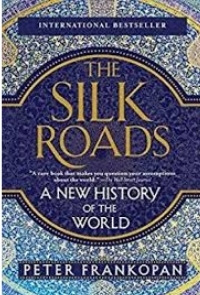
The Silk Roads: A New History of the World
Written by: Peter Frankopan
Reviewed by: Brad Williamson
Genre: Historical Non-fiction
Score: 4/5
What do you think of when you see pictures of the Roman Colosseum? What about the Taj Mahal? When you hear names like Alexander the Great and Genghis Khan, who do you envision? How much do you truly know about these people, monuments, and the defining events of history’s empires? In The Silk Roads, Peter Frankopan condenses more than 5,000 years of history into a 500-page book that is equally educational, interesting, and thought-provoking. Not only does he provide a new way to look at the evolution of human history and society, but he gifts us a framework for analyzing our collective heritage that works for the past, present, and, most importantly, into the future.
Everyone has heard of the silk road, which makes it the perfect launching pad for the novel; simultaneously, almost no layman firmly understands the complex nature behind how the silk road defined eras. Frankopan runs with this by first thoroughly educating the reader on the topic, then expanding on the idea of roads, routes, pathways, and arteries being the lifeblood of culture, commerce, and war. In this way the famous silk road is but one of many different corridors that have formed both socially and geographically which will perpetually exert their influences. Only by understanding how this works, and by accepting that even distant history is directly linked to the present, which affects the future, can we harness and improve the transmission of ideas and customs, greed and peace.
I don’t know if it’s because ancient history is more interesting to me than more modern events or if it’s something in Frankopan’s writing, but the last third of the book begins to lag. As historical accounts go, The Silk Roads isn’t extraordinarily long, but it’s not a quick read either, clocking in at well over 500 pages with another 100 worth of notes and appendices. This lull doesn’t affect my opinion of the novel, but it is something to consider before reading. This isn’t your typical historical account; it’s a massive, era-spanning, zeitgeist-altering tome that will force you to look at a slew of situations from perspectives that you never knew existed.
Yuval Noah Harari’s blockbuster Sapiens captured the interest of millions with its broad, macro-historical analysis of our species. In many ways, The Silk Roads is the polar opposite of Sapiens, but in my opinion it deserves no less praise or recognition. Instead of boiling human history down to simplistic axioms, Frankopan details the minutiae that have broken empires, lead to genocides, compiled riches beyond comprehension, and produced the science of the modern world. He stakes the bold claim that actions from thousands of years ago continue to influence us, but he backs it up with both physical evidence and concise mental extrapolation, and it is a wonder to behold.
The Silk Roads has something to teach everyone and is a well-written, thoroughly researched exploration of how we’ve arrived at the modern world, where we came from, and everything that happened between. Highly recommended.
Recent Comments